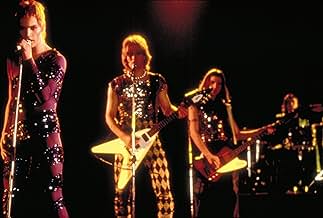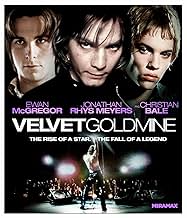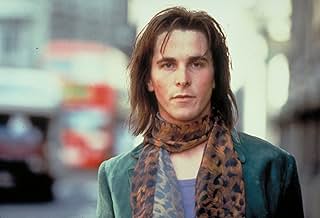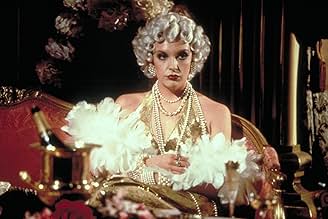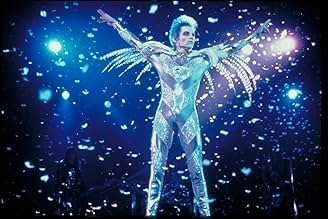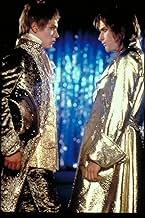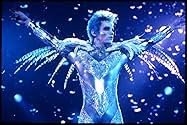Der britische Journalist Arthur Stuart untersucht die Karriere des Glam-Superstars der 1970er Jahre, Brian Slade, der in seinen frühen Jahren stark vom hart arbeitenden und rebellischen amer... Alles lesenDer britische Journalist Arthur Stuart untersucht die Karriere des Glam-Superstars der 1970er Jahre, Brian Slade, der in seinen frühen Jahren stark vom hart arbeitenden und rebellischen amerikanischen Sänger Curt Wild beeinflusst wurde.Der britische Journalist Arthur Stuart untersucht die Karriere des Glam-Superstars der 1970er Jahre, Brian Slade, der in seinen frühen Jahren stark vom hart arbeitenden und rebellischen amerikanischen Sänger Curt Wild beeinflusst wurde.
- Für 1 Oscar nominiert
- 4 Gewinne & 12 Nominierungen insgesamt
- Female Narrator
- (Synchronisation)
- Wilde Housemaid
- (as Maraid McKinley)
Empfohlene Bewertungen
At the end of the film, when Arthur Stuart sits to have a drink with Curt Wylde (Oh look! A play on Oscar!, Wylde looks up and tells him that, "The true artist creates beautiful things, and puts none of his own life into them". This is one of the several scenes in which Oscar Wilde is referenced subtly, seamlessly and beautifully.
Curt is not simply Iggy Pop. He is Oscar Wilde. He is the true artist of the crowd, because he creates music without using the art as a form of autobiography.
Brian Slade is Dorian Gray. He invests all of his persona into the public, and into his songs, trapping himself in an expectation. The alter-ego Maxwell Demon is eternal youth. It is the embodiment of Slade in a single moment. Unfortunately, he traps himself, and leaves no room for growth. The shooting accomplishes two things. Slade arranging this pseudo-murder is Dorian gray destroying his portrait. At first Dorian was intrigued, even excited by the changes he saw in the painting. Then it began to wear on him. So with Slade/ Demon. The hoax liberates Slade the way death does Gray. Also, This secures Maxwell Demon a place in history. Brian Slade was a pop-star who was too controversial and too personally naked in his work to have any real longevity. The hype would have faded, and if he changed or grew as a person, that would have meant changing everything about his art (as they were so interlocked) and would have led to cries of "sell out". Either way, he would have faded out and been likely forgotten (the way Britney Spears will hopefully do one day). By enacting this faux death, Slade guarantees Maxwell Demon some form of eternal youth, trading in his career to do so (selling his soul).
There's more, as well. Jerry Devine, for instance, is Lord Henry. Mandy is Sybil Vane. They aren't exact, of course, and there are other veins running through them that make them unique, but one can see the influence.
Beautifully done, and a well paid tribute to the genius of Oscar Wilde!
Here we get a young Christian Bale as a struggling kid trying to grow up in the age of glam rock. The confusion of trying to be who you are and the confusion of trying to figure out who that person is, something that is understandable to anyone who has ever been a teenager. Like so many, he finds himself in music- that of Brian Slade. Meyers is outstanding as a lowly boy who makes it with the big boys. He plays the climb to fame brilliantly and the demise of glam rock with emotion. Toni Collette adds the flare that is necessary and shows the true strength in what a woman will do/put up with for love. She is a delight and she plays well with Meyers. Ewan McGregor is also terrific as Curt Wild, the perfect half to Slade's glam.
The music is what Goldmine is really all about. Meyers and McGregor sing some of the tunes themselves, but the addition of Radiohead's Thom Yorke to the mix as well as the boys from Placebo are an excellent addition to an already great soundtrack. Adding Lou Reed seems like over kill, but I'll take it- if there is anything that I learned from watching Goldmine many times- is that the bigger the better.
This is a great coming of age movie- it is a bit adult. There are heavy issues here such as drug abuse, alcoholism, adultery, homosexuality, orgies...be aware-
i loved the camp, outfits, and excesses, and was unexpectedly moved by the story. using a queer, ex-fan reporter to frame the movie--so as to emphasize the effect that this bi-positive bi-posing rock star had on queer kids, and how upsetting his betrayal of them was--worked brilliantly. the use of arty-fairydust moments to capture the importance of fantasy to this scene worked wonderfully. i really appreciated jack fairy, as a character and as a link from glitter to the drag scene--this is not usually acknoledged. and whenever the movie veered too far into preciousness, the iggy pop/kurt wild character showed up to redeem it. his origin story--18 months of electroshock after being caught having sex with a boy--was a much-needed dose of reality in the midst of the glitter. and whenever the movie needed testosterone and directness, he appeared to supply it.
well, i think it's pretty clear that i'm the demographic for this movie--i'm the right age, i'm a fag, and i love both punk and glitter. but my straight boyfriend adored it too. if you ever enjoyed glitter or punk, keep an open mind & check it out, i think you'll like it. even if you don't, you can always look at the pretty outfits.
It could have been more bold or daring, but it is just sentimental and nostalgic in a strange way: I got the impression that the movie doesn't fully respect it's characters or their actions, which is not a problem if it creates a feeling of objective distance, but such detachment is broken by the sentimentalism: should we miss glam rock or laugh at it? The movie is about glam rock as a musical and a social movement, as an attitude, but the general tone is closer to an elegy than to a defense without actually being neither.
I liked the movie, though, specially Ewan McGregor and the performances by bands highly influenced by glam rock.
Wusstest du schon
- WissenswertesThe film was originally supposed to feature some of David Bowie's music, hence the title, which was a Bowie song from the 1970s; however, when Bowie learned that the script for the film was partially based on the unauthorized biographies "Stardust: The David Bowie Story" written by Henry Edwards and Tony Zanetta and "Backstage Passes" written by Bowie's ex-wife Angie Bowie, he threatened the producers with a lawsuit. Bowie's songs were, therefore, not used, and the script was partially re-written to avoid unnecessary resemblance between Bowie and the Bowie-style character Brian Slade.
- PatzerArthur figures out the mystery of what happened to Brian Slade by seeing Shannon on TV. He however had no idea what she looked like so seeing her on TV a decade after the events that led to Brian's "death" could not have happened.
- Zitate
Brian Slade: Man is least himself when he talks in his own person... Give him a mask and he'll tell you the truth.
- Crazy CreditsThe solid background color behind the credits changes several times as they play.
- SoundtracksNeedle in the Camel's Eye
Written by Brian Eno and Phil Manzanera
Performed by Brian Eno
Courtesy of Caroline Records, Inc.
Top-Auswahl
Details
- Erscheinungsdatum
- Herkunftsländer
- Offizieller Standort
- Sprachen
- Auch bekannt als
- Glitter Kids
- Drehorte
- Lyceum Theatre, Wellington Street, Covent Garden, London, England, Vereinigtes Königreich(Reporting outside at about 6 mins 40 secs in)
- Produktionsfirmen
- Weitere beteiligte Unternehmen bei IMDbPro anzeigen
Box Office
- Bruttoertrag in den USA und Kanada
- 1.053.788 $
- Eröffnungswochenende in den USA und in Kanada
- 301.787 $
- 8. Nov. 1998
- Weltweiter Bruttoertrag
- 1.054.291 $
- Laufzeit2 Stunden 3 Minuten
- Farbe
- Sound-Mix
- Seitenverhältnis
- 1.85 : 1
Zu dieser Seite beitragen



